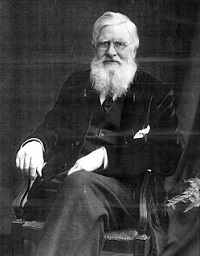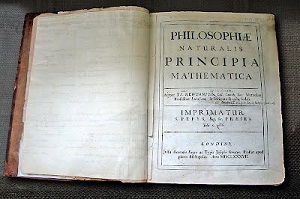TRANSLATE THIS ARTICLE
Integral World: Exploring Theories of Everything
An independent forum for a critical discussion of the integral philosophy of Ken Wilber
 David Christopher Lane David Christopher Lane, Ph.D.
Professor of Philosophy, Mt. San Antonio College Lecturer in Religious Studies, California State University, Long Beach Author of Exposing Cults: When the Skeptical Mind Confronts the Mystical (New York and London: Garland Publishers, 1994) and The Radhasoami Tradition: A Critical History of Guru Succession (New York and London: Garland Publishers, 1992). SEE MORE ESSAYS WRITTEN BY DAVID LANE
This is the first part of a three part film and article series
Natural Selection
and Metaphysics
The Continuing Darwin-Wallace Debates, Part I
David Lane
 Alfred Russell Wallace
Alfred Russell Wallace
I again must applaud Elliot Benjamin�s efforts in continuing our discussion on Alfred Russel Wallace and his philosophical views on natural selection and how far it extends both in the past and in the future. Ironically, it is precisely because of Wallace�s later writings on spiritualism and his overt metaphysical leanings that his seminal contributions to evolutionary theory have been greatly overshadowed by Darwin�s own writings, which, to be fair, were influenced (particularly his Descent of Man) by Wallace�s very timely and pregnant critiques as can be gleaned from their extensive correspondence. I highly recommend a close examination of their letters (to and fro) on the Darwin Project website which contains a vast collection of Darwin�s own letters, numbering over 7,500 distinct pieces. I think part of the confusion over Wallace�s nuanced views can be ameliorated if we distinguish the mechanism of natural selection which by itself doesn�t necessitate anything metaphysical from how such a sieving process initially arose (first causes) and what it may be incapable of ultimately portending.
 Philosophi� Naturalis Principia Mathematica
Philosophi� Naturalis Principia Mathematica
While it is certainly true that Wallace�s later writings create a larger context in which to view natural selection, the eliminating mechanism still works regardless of what spiritual or non-spiritual views one holds. This is analogous in some way to Issac Newton�s mathematical work on gravity as espoused in his groundbreaking (even if dense) book, Philosophi� Naturalis Principia Mathematica which provides mathematical and geometrical tools to understand classical mechanics and the laws of planetary motion.
Newton, however, would later on argue against taking interpreting his work as suggesting that the cosmos was merely a vast machine like apparatus, since as he famously quipped,
"Gravity explains the motions of the planets, but it cannot explain who set the planets in motion. God governs all things and knows all that is or can be done."
I think something similar is the case with Wallace�s own later writings, which attempted to provide a wider hermeneutic and philosophic overview of the universe and its ultimate causation. Therefore, even if it may appear contradictory at first glance, Wallace�s original papers on how evolution proceeds via natural selection (like Newton�s work on celestial mechanics) are distinct from his later metaphysical imputations. Why? Because just as ocean waves can be understood by the transference of wind energy onto water (without resorting to their ultimate ontology) so too can the mutation of species be understood by natural selection, even if it doesn�t address the ultimate causation of how the cosmos first came into existence.
This is precisely why the scientific journal Nature criticized Wallace over confusing first and secondary causes when it wrote,
“All the phenomena we know are of necessity ultimately referable to the First Great Cause: the object of science is discover their secondary causes . . . . To fall back for explanation upon the primary efficient cause of their existence and the design with they were framed is only to confuse two distinct branches of inquiry.”
It is for this reason that Alfred Russel Wallace will forever be rightfully cited along with Charles Darwin as the co-discoverer of natural selection, even if in his later writings (like Newton before him) he wishes to see a “super” natural teleology behind the universe�s unfolding. Simply put, it is called natural selection precisely because it is “natural”--within nature and empirically testable and observable over time. That there may be other processes at work which are not strictly due to natural selection is certainly true and is a very fruitful line of inquiry. Ironically, it was Darwin who had to withstand Wallace�s harsh criticism when he tried to emphasize the importance of “sexual” selection in contradistinction to natural selection, since Wallace�s advocacy of natural selection was much more orthodox and (within limits) more far reaching than Darwin�s!
Finally, I want to thank Elliot Benjamin for focusing our attention on the varying and insightful views of Alfred Russel Wallace whose later contrarian views on the subject of evolution and its creative design deserves more attention than it has received. In this spirit, I am in the process of writing two more essays (and two more little films) on Wallace�s views on consciousness and his immersion with spiritualism.
|
 David Christopher Lane, Ph.D.
Professor of Philosophy, Mt. San Antonio College Lecturer in Religious Studies, California State University, Long Beach Author of Exposing Cults: When the Skeptical Mind Confronts the Mystical (New York and London: Garland Publishers, 1994) and The Radhasoami Tradition: A Critical History of Guru Succession (New York and London: Garland Publishers, 1992).
David Christopher Lane, Ph.D.
Professor of Philosophy, Mt. San Antonio College Lecturer in Religious Studies, California State University, Long Beach Author of Exposing Cults: When the Skeptical Mind Confronts the Mystical (New York and London: Garland Publishers, 1994) and The Radhasoami Tradition: A Critical History of Guru Succession (New York and London: Garland Publishers, 1992).

